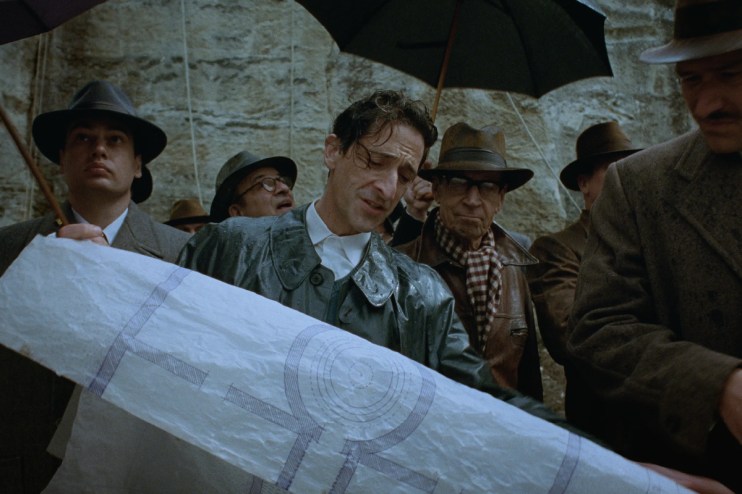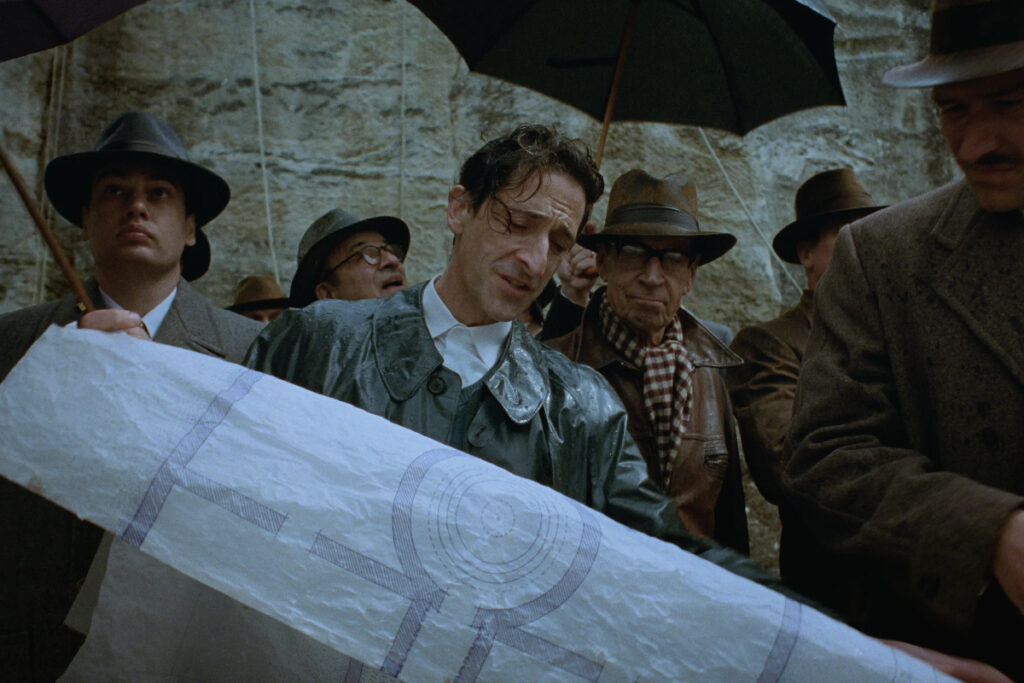
As we head into Oscars season, one of the front runners this year is Brady Corbet’s The Brutalist. Already a Golden Globe winner, it is the director’s third and most ambitious feature following 2015’s The Childhood Of A Leader and 2018’s Vox Lux. That ambition has more than been realised.
Adrien Brody plays László Tóth, a Hungarian-Jewish architect whose celebrated career is cut short as he emigrates to America fleeing The Holocaust. Eagerly awaiting news of his wife Erzsébet (Felicity Jones), from whom he is separated, he takes a job with his cousin renovating the library of wealthy industrialist Harrison Lee Van Buren (Guy Pearce). Initially rejecting his work, Van Buren later recognises his genius and commissions Tóth to design a grand project.
From intricately designed titles, to the imposing soundtrack, Corbet signals that this is an epic story. Every single frame is as if it were designed by a master architect itself, with the majesty of Tóth’s work contrasting with the often-desperate situations he finds himself in. At a sizeable three hours and twenty minutes (not including an intermission), there’s no room for lulls in the narrative lest you lose the crowd. Happily, the experience means that the time flies by as you are treated to a celebration of artistry and resilience.
Much of Tóth’s journey follows the struggles of a refugee to restart their lives after the horrors of war. While Brody’s lead may rejoice at the sight of the Statue of Liberty (framed upside down in a portent of what is to come), his trauma and otherness are a consistent barrier to happiness. In the meeting rooms, he will always be the outsider; and in his home there will always be something lost to Erzsébet. It’s no mawkish elegy to displaced people, rather a fierce portrait of a man whose genius means little against the prejudices of his new home.
Equally captivating is the struggle between wealth and artistry, particularly when racial equality is concerned. There is an uncomfortable feeling as Tóth is welcomed into the Van Buren home, knowing that his new-found comfort rests on the volatile whims of his employer. There’s a tension similar to Paul Thomas Anderson’s There Will Be Blood, albeit with a more sympathetic protagonist, as Tóth’s passion finds itself on a collision course with Van Buren’s need for power. As the latter begins to refer to Tóth as more animal than artist, the audience finds itself on a path to inevitable destruction.
Despite this, there is beauty in much of the storytelling. It would be easy to compare Brody’s performance to his Oscar-winning moment in The Pianist, but this offers a much more complex portrayal. In the midst of suffering and addiction, he finds immortality through his work and his connection with Erzsébet, played with outstanding grace by Jones.
On the other side of the spectrum, Pearce is electric as a man who comes across as animalistic, no matter how expensive his suits are. A firebrand full of brash, post-war American confidence, it is the Australian star’s best performance since his late 90s breakthrough. Elsewhere, Joe Alwyn simmers with moneyed entitlement as Harrison’s son, while Raffey Cassidy delivers splendid work as Zsófia, a character who spends much of the film mute but conveying the agonies of her journey.
After stunning with his previous two films, The Brutalist may well be Corbet’s masterpiece. Moving, uncomfortable, and achingly beautiful, it’s a film that deserves to be remembered long after the awards are handed out.
• The Brutalist is in cinemas from 24th January



